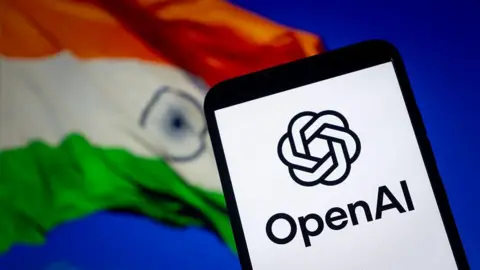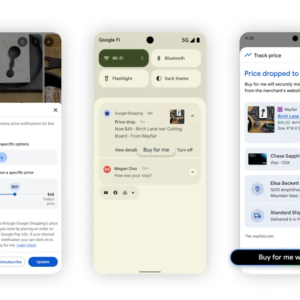Nikita YadavBBC Information, Delhi
 Future Publishing through Getty Photos
Future Publishing through Getty PhotosBeginning this week, thousands and thousands of Indians will get one 12 months of free entry to ChatGPT’s new, low-cost “Go” AI chatbot.
The transfer follows related bulletins in latest weeks from Google and Perplexity AI, who’ve partnered with native Indian cell corporations to present customers a 12 months or extra of free entry to their AI instruments.
Perplexity tied up with the nation’s second largest cell community supplier Airtel, whereas Google partnered with Reliance Jio, India’s largest telephony big, to bundle free or discounted AI instruments with month-to-month knowledge packs.
Analysts say such affords should not be mistaken for generosity as they’re calculated investments and a long-term wager on India’s digital future.
“The plan is to get Indians hooked on to generative AI earlier than asking them to pay for it,” Tarun Pathak, an analyst at Counterpoint Analysis, advised the BBC.
“What India affords is scale and a younger viewers,” says Mr Pathak, including that different huge markets like China may rival India when it comes to the variety of customers, however its tightly regulated tech surroundings limits overseas entry.
India, in contrast, affords an open and aggressive digital market and international tech is clinching the chance to enlist thousands and thousands of latest customers right here to coach their AI fashions.
OpenAI, Perplexity and Google didn’t reply to the BBC’s queries.
India has over 900 million internet users and affords a few of the world’s least expensive knowledge. Its on-line inhabitants is younger – most web customers are below the age of 24, belonging to a technology that lives, works and socialises on-line, utilizing smartphones.
Bundling these AI instruments with knowledge packs creates an enormous alternative for tech corporations given India’s knowledge consumption outpaces a lot of the world. The extra Indians use these platforms, the extra first-hand knowledge corporations can entry.
“India is an extremely numerous nation. The AI use circumstances rising from right here will function invaluable case research for the remainder of the world,” says Mr Pathak.
“The extra distinctive, first-hand knowledge they collect, the higher their fashions, notably generative AI techniques, develop into.”
Whereas a win-win for AI corporations, these free choices elevate questions from a shopper perspective, particularly relating to implications on knowledge privateness.
“Most customers have at all times been keen to surrender knowledge for comfort or one thing free and that can proceed,” says Delhi-based expertise author and analyst Prasanto Ok Roy.
However that is the place the federal government should step in, he says.
“Regulation might want to improve as authorities determine how you can handle the broader situation of individuals freely giving their knowledge so freely,” says Mr Roy.
 NurPhoto through Getty Photos
NurPhoto through Getty PhotosAt current, India doesn’t have a devoted regulation governing synthetic intelligence. There may be the broader Digital Personal Data Protection Act (DPDP) 2023 round digital media and privateness, however it’s but to be enacted.
Consultants say that whereas the act introduces broad protections round private knowledge, its implementation guidelines are nonetheless pending and it doesn’t but tackle AI techniques or algorithmic accountability.
However as soon as the regulation comes into impact “it should most likely be one of the superior from a digital [privacy] perspective”, Mahesh Makhija, expertise consulting chief at Ernst and Younger advised the BBC.
For now although, India’s versatile regulatory surroundings permits corporations like OpenAI and Google to bundle free AI instruments with telecom plans, one thing far more durable to do in different nations.
As an illustration, the European Union’s AI rules set robust requirements for transparency and knowledge governance, whereas South Korea’s incoming regulations go a step additional, requiring labels on AI-generated content material and making operators answerable for the way their techniques are used.
In these areas, such affords would have triggered compliance necessities round person consent and knowledge safety, making them more durable to roll out at scale.
Mr Roy says India wants each stronger person consciousness and clearer regulation, however with out stifling innovation.
“At this level, we’d like light-touch regulation, however that should evolve because the extent of potential hurt turns into clearer”.
Till then, the worldwide AI corporations shall be hoping that by providing these freebies they’ll replicate India’s previous expertise of onboarding thousands and thousands of latest customers with deeply discounted web knowledge.
Whereas AI is unlikely to observe a closely monetised mannequin and is as an alternative anticipated to be adopted as a low-cost, value-driven service, the nation’s sheer volumes provide promise.
“As an illustration, even when simply 5% of free customers develop into subscribers, that is nonetheless a big quantity,” says Mr Pathak.
Comply with BBC Information India on Instagram, YouTube, X and Facebook.















